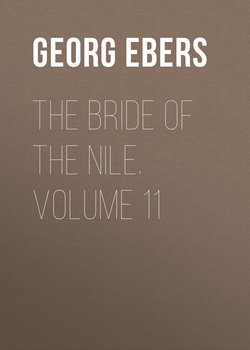Читать книгу The Bride of the Nile. Volume 11 - Георг Эберс, Georg Ebers - Страница 2
CHAPTER XVIII
ОглавлениеThe mysterious old sage had no sooner left the judgment-hall with the Vekeel than he begged for a private interview. Obada did not hesitate to turn the keeper of the prison, with his wife and infant, out of his room, and there he listened while Horapollo informed him of the fate to which he destined the condemned girl. The old man's scheme certainly found favor with the Negro; still, it seemed to him in many respects so daring that, but for an equivalent service which Horapollo was in a position to offer Obada, he would scarcely have succeeded in obtaining his consent.
All the Vekeel aimed at was to make it very certain that Orion had had a hand in the flight of the nuns, and chance had placed a document in the old man's hands which seemed to set this beyond a doubt.
He had effected his removal to the widow's dwelling in the cool hours of early morning. He had taken with him, in the first instance, only the most valuable and important of his manuscripts, and as he was placing these in a small desk—the very same which Rufinus had left for Paula's use—Horapollo found in it the note which the youth had hastily written when, after waiting in vain for Paula as she sat with little Mary, he had at last been obliged to depart and take leave of Amru. This wax-tablet, on which the writing was much defaced and partly illegible, could not fail to convince the judges of Orion's guilt, and the production of this piece of evidence enabled the old man to extort Obada's consent to his proposal as to the mode of Paula's death. When they finally left the warder's room, the Negro once more turned to the keeper of the prison and told him with a snort, as he pointed to his pretty wife and the child at her breast, that they should all three die if he allowed Orion to quit his cell for so much as an instant.
He then swung himself on to his horse, while Horapollo rode off to the Curia to desire the president of the council to call a meeting for that evening; then he betook himself to his new quarters.
There he found his room carefully shaded, and as cool as was possible in such heat. The floor had been sprinkled with water, flowers stood wherever there was room for them, and all his properties in scrolls and other matters had found places in chests or on shelves. There was not a speck of dust to be seen, and a sweet pervading perfume greeted his sensitive nostrils.
What a good exchange he had made! He rubbed his withered hands with satisfaction as he seated himself in his accustomed chair, and when Mary came to call him to dinner, it was a pleasure to him to jest with her.
Pulcheria must lead him through the viridarium into the dining-room; he enjoyed his meal, and his cross, wrinkled old face lighted up amazingly as he glanced round at his feminine associates; only Eudoxia was absent, confined to her room by some slight ailment. He had something pleasant to say to each; he frankly compared his former circumstances with his present position, without disguising his heartfelt thankfulness; then, with a merry glance at Pulcheria, he described how delightful it would be when Philippus should come home to make the party complete—a true and perfect star: for every Egyptian star must have five rays. The ancients had never painted one otherwise nor graven it in stone; nay, they had used it as the symbol for the number five.
At this Mary exclaimed: "But then I hope—I hope we shall make a six- rayed star; for by that time poor Paula may be with us again!"
